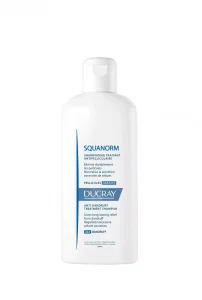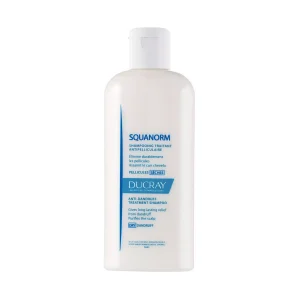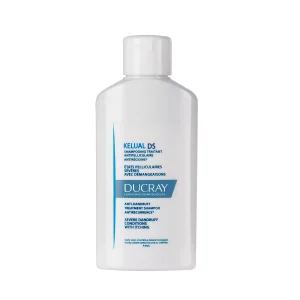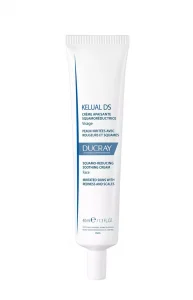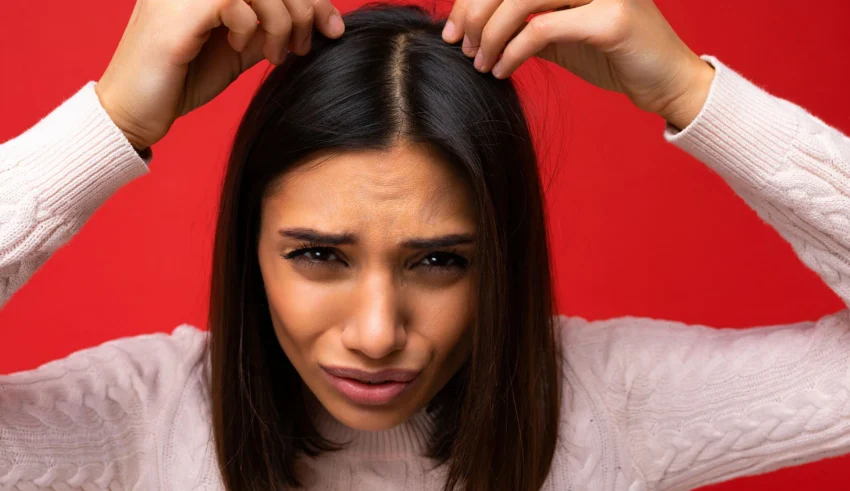
If you scratch your scalp and see white flakes on your hair and clothes, you may have dandruff. These flakes are a sign that incessant itching is about to set in. But have you noticed that it’s not just the change in weather that triggers dandruff? Is your hair very greasy on certain days when dandruff is most abundant? It’s no coincidence. Your hormones and dandruff are connected. Let’s find out the link between hormonal swings and dandruff in this article from The Dermo Lab.
What’s the link between hormones and dandruff?
Hormones play an essential role in the production of the natural oils that keep your hair moisturized. However, a slight hormonal imbalance can lead to excessive sebum production, which in turn increases the amount of sebum on which microbes feed. If you’re sensitive to oleic acid, this excessive sebum production can lead to dandruff. For some people, dandruff is due to hormonal changes that occur during puberty, when the body produces more sebum than usual.
The hormones that control the sebaceous glands therefore play a crucial role in the appearance of dandruff, providing the key ingredient needed to create the scalp irritant oleic acid. With around 50% of the population affected, there’s a 50/50 chance that you’ll suffer from dandruff at some point in your life.
What are the other causes of dandruff?
Here are a few other possible factors:
People with seborrheic dermatitis have irritated, oily skin and are more prone to dandruff. The skin is red, oily, and covered with white or yellow scales.
2- Certain skin conditions
Certain skin conditions can cause scalp flaking, such as psoriasis, eczema, ringworm, and contact dermatitis.
3- Yeast
Dandruff is often caused by Malassezia, a fungus that usually lives on the scalp and feeds on the oils secreted by hair follicles.
Malassezia is not usually a problem, but in some people, the immune system overreacts to the fungus. The scalp can become irritated and produce extra skin cells.
When these cells die and fall off, they mix with hair and scalp oil to form dandruff.
4- Shampoo and hair care products
Some hair care products can irritate the scalp and cause dandruff. If you find that a product causes irritation, try switching to a mild shampoo.
What to do about dandruff?
Treating hormonal dandruff can be difficult, but help is on the way. If you’re sensitive to oleic acid, you need to watch out for dandruff. It’s easy to give in to the urge to scratch, but this can lead to scalp injuries and lesions. So what’s the right treatment for hormonal dandruff? Let’s take a look:
1- USE A SPECIAL ANTI-DANDRUFF FORMULA
Your usual shampoo can’t get rid of dandruff. You need a hair product specially formulated to fight dandruff without damaging your hair. If that’s what you’re looking for, try the following anti-dandruff shampoos:
For oily dandruff:
Ducray Squanorm Anti-Dandruff Treatment Shampoo – Oily Dandruff
Benefits:
This shampoo uses a complete formula to loosen adherent dandruff. It durably eliminates dandruff and regulates excessive sebum secretion. Its purifying cleansing base gently washes hair and scalp.
Results: Effective from 1st application.
Apply to damp scalp. Rinse off. Reapply and leave it on for 3 minutes. Rinse thoroughly. Use twice a week for 6 weeks.
For dry dandruff:
Ducray Squanorm Anti-Dandruff Treatment Shampoo – Dry Dandruff
Benefits:
This shampoo provides rapid, long-lasting action thanks to specific anti-dandruff active ingredients. Its creamy texture makes it pleasant to apply. It durably eliminates dry, non-adherent dandruff and cleanses the scalp.
Apply to damp scalp. Rinse off. Reapply and leave it on for 3 minutes. Rinse thoroughly. Use twice a week for 6 weeks.
For dandruff caused by seborrheic dermatitis:
Ducray Kelual DS Treatment Shampoo
Benefits:
This shampoo effectively eliminates dandruff and rapidly soothes the scalp. Its complete formula, made up of purifying and complementary active ingredients, acts on all the factors involved in severe dandruff. It gives you 100% satisfaction after two weeks.
Intensive treatment phase: 3 times a week for 2 weeks.
Maintenance phase: Once a week.
In cases of seborrheic dermatitis, we recommend using a topical cream containing an antifungal ingredient such as ciclopiroxolamine, in addition to shampoo, to eliminate flakes and purify the skin at the edge of the scalp.
That’s why we recommend the following cream from Ducray:
Ducray Kelual DS Squamo-Reducing Anti-Recurrence Soothing Cream
2- MOISTURIZE
Contrary to popular belief, you need to moisturize your hair even when you have dandruff. This prevents the scalp from drying out and the sebaceous glands from increasing their sebum production. The best way to moisturize your hair is to choose a good conditioner.
3- PRACTICE GOOD HAIR HYGIENE
Don’t skip your hair-washing days if you have dandruff. Hormones and dandruff don’t mix, and if you’re experiencing increased sebum production, you need to keep your hair clean. The shampoo helps keep oils and dandruff at bay. You should also avoid scratching your scalp. Trim your nails. Scratching your scalp only aggravates irritation, and there’s no end to this vicious circle.
4- LEARN TO MANAGE STRESS
If you’re prone to hormonal dandruff, stress plays a key role in triggering it. Stress can weaken your immune system, allowing microbes to thrive. Stress makes dandruff worse, so you should try stress-relieving activities, such as going for a walk or practicing breathing exercises to manage it.
Hormones are indeed the cause of dandruff. However, with the right anti-dandruff products and a good hair care routine, you can get rid of dandruff. But if the problem persists and you notice redness, severe flaking, or swelling of the scalp, consult your doctor.
Does dandruff have any complications?
Dandruff rarely leads to complications, and most people don’t need to see a doctor. However, dandruff can sometimes be a sign of a more serious condition.
A doctor should be consulted in the following cases:
- There are signs of infection, such as redness, tenderness, or swelling.
- Dandruff is severe and home treatment is not sufficient.
- There are signs of eczema, psoriasis, or another skin condition.
- The scalp is very itchy.
Treatment can sometimes lead to complications. If a shampoo or scalp treatment causes irritation, try another product.
Last Updated on June 20, 2024
